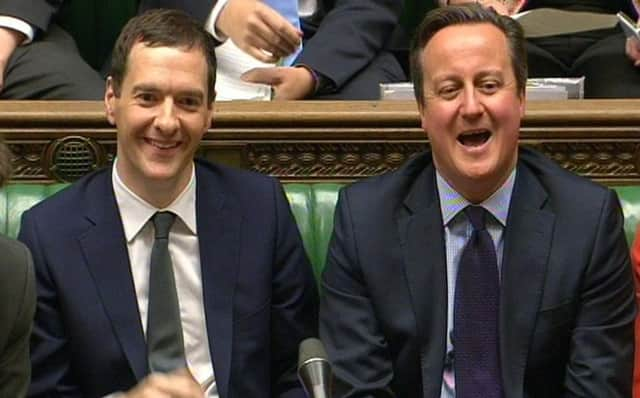Leader: Osborne’s U-turn is a smart bit of footwork


The Chancellor’s U-turn on tax credits in his autumn statement was a complete surprise, going further than many predictions, but it has actually cost him very little.
George Osborne is to scrap the planned cuts that would have affected millions of low-paid workers, with the £4.4 billion savings due to have taken effect from next April.
Advertisement
Hide AdAdvertisement
Hide AdIt had been commonly thought he would have to delay their implementation, or go for a phased approach, following the House of Lords throwing out the plans last month.
In fact, just one element of the cuts has survived from the Budget in July – a reduction from £5,000 to £2,500 in the amount of extra income a claimant can earn without losing benefits. So what do we make of the decision? Has Mr Osborne now become a listening Chancellor? Has he been forced to bow to public pressure?
Stewart Hosie, the SNP’s treasury spokesman, was in no doubt, describing it as a “complete and humiliating” turnaround.
It’s actually none of these things, but simply a shrewd political move.
True, the Chancellor has been given the necessary leeway by better-than-expected tax receipts and rock-bottom debt interest rates.
Mr Osborne also admitted his move will mean he will breach his self-imposed welfare cap in each of the next three years.
However, it means he has been nimbly able to avoid the pitfalls of pursuing the tax credits “reform”, aware the policy could come to inflict significant damage on the Conservatives.
Mr Osborne could also afford to, knowing that tax credits will be phased out within three years. They will be replaced by the new universal credit, and that will be less generous. So the Chancellor will take a bit longer to save th emoney, but he has avoided the political fallout with a clever bit of footwork.
Advertisement
Hide AdAdvertisement
Hide AdElsewhere in the statement, Mr Osborne was right to protect police budgets in England and Wales, especially in light of the Paris attacks. There had been warnings that underfunded forces would be unable to cope with a similar terrorist assault here.
Also saved from cuts were health and education spending south of the Border, along with international aid and defence.
The news that the UK government expects to borrow £8bn less than forecast and achieve a £10bn budget surplus by 2020 is also sticking to his previous target.
So, the Chancellor has managed to protect the visible, front-line areas of spending. By contrast, the savings will come largely in areas where the effects will be far more difficult to discern.
No-one knows exactly how the cuts in Whitehall departments will impact, and businesses and landlords who are hit could well pass on their increased costs.
Transport will be the biggest casualty. But again, the highest-profile schemes, such as major English rail electrification projects which will free up diesel trains for inter-city use by ScotRail, have been saved.
So, all in all, a clever balancing act by Mr Osborne, but no more than we have come to expect from him. It will probably do nothing to harm his chances of succeeding Mr Cameron.